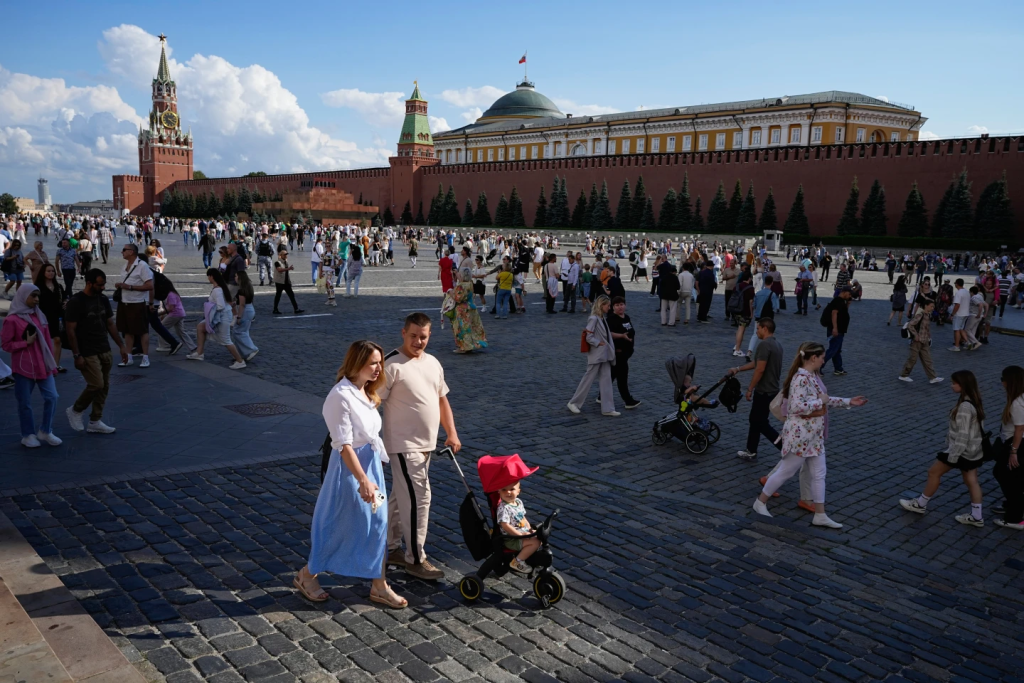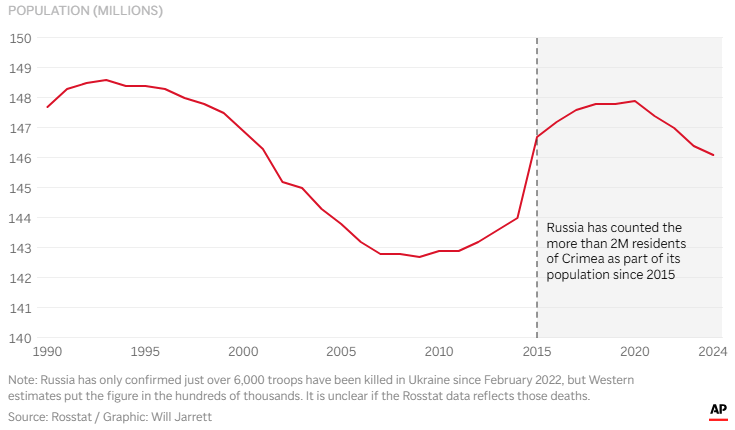For a quarter century, President Vladimir Putin has faced the specter of Russia’s shrinking and aging population.
In 1999. a year before he came to power, the number of babies born in Russia plunged to its lowest recorded level. In 2005. Putin said the demographic woes needed to be resolved by maintaining “social and economic stability.”
In 2019. he said the problem still “haunted” the country.
As recently as Thursday, he told a Kremlin demographic conference that increasing births was “crucial” for Russia.
Putin has launched initiatives to encourage people to have more children — from free school meals for large families to awarding Soviet-style “hero-mother” medals to women with 10 or more children.
“Many of our grandmothers and great-grandmothers had seven, eight, and even more children,” Putin said in 2023. “Let’s preserve and revive these wonderful traditions. Having many children and a large family must become the norm.”
The U.S. Department of Agriculture has posted a notice on its website saying federal food aid will not go out Nov. 1. raising the stakes for families nationwide as the government shutdown drags on.
The new notice comes after the Trump administration said it would not tap roughly $5 billion in contingency funds to keep benefits through the Supplemental Nutrition Assistance Program, commonly referred to as SNAP, flowing into November. That program helps about 1 in 8 Americans buy groceries.
“Bottom line, the well has run dry,” the USDA notice says. “At this time, there will be no benefits issued November 01. We are approaching an inflection point for Senate Democrats.”
The shutdown, which began Oct. 1. is now the second-longest on record. While the Republican administration took steps leading up to the shutdown to ensure SNAP benefits were paid this month, the cutoff would expand the impact of the impasse to a wider swath of Americans — and some of those most in need — unless a political resolution is found in just a few days.
The administration blames Democrats, who say they will not agree to reopen the government until Republicans negotiate with them on extending expiring subsidies under the Affordable Care Act. Republicans say Democrats must first agree to reopen the government before negotiation.
Democratic lawmakers have written to Agriculture Secretary Brooke Rollins requesting to use contingency funds to cover the bulk of next month’s benefits.
But a USDA memo that surfaced Friday says “contingency funds are not legally available to cover regular benefits.” The document says the money is reserved for such things such as helping people in disaster areas.
It cited a storm named Melissa, which has strengthened into a major hurricane, as an example of why it’s important to have the money available to mobilize quickly in the event of a disaster.
The prospect of families not receiving food aid has deeply concerned states run by both parties.
Some states have pledged to keep SNAP benefits flowing even if the federal program halts payments, but there are questions about whether U.S. government directives may allow that to happen. The USDA memo also says states would not be reimbursed for temporarily picking up the cost.
Other states are telling SNAP recipients to be ready for the benefits to stop. Arkansas and Oklahoma, for example, are advising recipients to identify food pantries and other groups that help with food.
Sen. Chris Murphy, D-Conn., accused Republicans and Trump of not agreeing to negotiate.
“The reality is, if they sat down to try to negotiate, we could probably come up with something pretty quickly,” Murphy said Sunday on CNN’s “State of the Union.” “We could open up the government on Tuesday or Wednesday, and there wouldn’t be any crisis in the food stamp program.”
Russia’s population is lower now than it was in 1990
Over the 35-year period, the Russian population fell by approximately 1%
Population (millions)
The population also is significantly older. In 1990. 21.1% was 55 or older, government data said. In 2024. that figure was 30%.
Since the 2015 peak, the number of births has fallen annually, and deaths are now outpacing births. There were only 1.22 million live births last year — marginally above the 1999 low. Demographer Alexei Raksha reported the number of babies born in Russia in February 2025 was the lowest monthly figure in over two centuries.
Russia is trying new restrictions to halt the backslide and embrace what it calls “traditional family values” with laws banning the promotion of abortion and “child-free ideology” and outlawing all LGBTQ+ activism.
Officials believe such values are “a magic wand” for solving demographic problems, said Russian feminist scholar Sasha Talaver.
In the government’s view, women might be financially independent, but they should be “willing and very excited to take up this additional work of reproduction in the name of patriotism and Russian strength,” she said.
Harsh demographic history
In Russia, as in much of the West, shrinking births are usually linked with economic turbulence. Young couples in cramped apartments, unable to buy their own homes or who fear for their jobs, usually have less confidence they can afford raising a child.
But Russia is saddled with a harsh demographic history.
About 27 million Soviet citizens died in World War II, diminishing the male population dramatically.
As the country was beginning to recover, the Soviet Union collapsed, and births tumbled again.
The number of Russian women in their 20s and early 30s is small, said Jenny Mathers of the University of Aberystwyth in Wales, leaving authorities “desperate to get as many babies as possible out of this much smaller number of women.”
Although Russia has not said how many troops have been killed in Ukraine, Western estimates have put the dead in the hundreds of thousands. When the war began, many young Russians moved abroad — some for ideological reasons like escaping a crackdown on dissent or to avoid military service.
“You’ve got a much-diminished pool of potential fathers in a diminished pool of potential mothers,” Mathers said. That is a particular problem for Putin, who has long linked population and national security, she said.
Some family-friendly initiatives are popular, like cash certificates for parents that can go toward pensions, education or a subsidized mortgage.
Others are controversial, such as one-time payments of about $1.200 for pregnant teenagers in some regions. Officials say these aim to support vulnerable mothers, but critics say they encourage such pregnancies.
Still other programs seem mostly symbolic. Since 2022. Russia has created state holidays like Family, Love and Fidelity Day in July, and Pregnant Women’s Day -– celebrated on April 7 and Oct. 7.
Last year, Russia’s fertility rate — the average number of children born per woman — was 1.4. state media reported. That’s well below the 2.1 replacement rate for the population, and slightly lower than the U.S. figure of 1.6 released by the Centers for Disease Control and Prevention.
Discouraging abortion
Some regions have laws making it illegal to “encourage abortions,” while national legislation in 2024 banned the promotion of “child-free propaganda.” The wording in such initiatives is often vague, leaving them open to interpretation, but the change was enough to prompt producers of a reality TV hit “16 and Pregnant” to change the show’s name to “Mommy at 16.”
For many women, the measures make already sensitive conversations even more fraught. A 29-year-old woman who’s decided not to bear children told The Associated Press she sees a gynecologist at a private Moscow clinic, rather than a state one, to avoid intrusive questions.
“Whether I plan to have children, whether I don’t plan to have children — I don’t get asked about that at all,” she said, speaking on condition of anonymity because she feared repercussions. It’s “a completely different story” at state-run clinics, she said.
An increasing number of laws limit access to abortion. While the procedure remains legal and widely available, more private clinics no longer offer abortion services. New legislation has also curbed the sale of abortion-inducing pills, a move that also affects some emergency contraceptives.
Women are encouraged to go to state clinics, where waits are longer and some sites refuse to do abortions on certain days. By the time patients have completed compulsory counseling and mandatory waiting periods of between 48 hours and a week, they risk surpassing the time frame for a legal abortion.
Abortions have steadily decreased under these laws, although experts say the number of procedures already was falling. Still, there hasn’t been a corresponding increase in births, and activists believe restricting abortion will only harm the health of women and children.
“The only thing you will get from this is illegal abortions. That means more deaths: more children’s deaths and more women’s deaths,” says Russian journalist and feminist activist Zalina Marshenkulova.
She sees the new government limits as repression for repression’s sake. “They exist just to ban, to block any voice of freedom,” she told AP.
Curbing immigration
Russia could increase its population by allowing more immigrants — something the Kremlin is unlikely to adopt.
Russian officials have recently fomented anti-migrant sentiment, tracking their movements, clamping down on their employment and impeding their children’s rights to education. Central Asians who have traditionally traveled to Russia for work are looking elsewhere, hoping to avoid growing discrimination and economic uncertainty.
While the war in Ukraine continues, Moscow can promise financial rewards for would-be parents but not the stability needed for gambling on the future.
When people lack confidence about their prospects, it’s not a time for having children, Mathers said, adding: “An open-ended major war doesn’t really encourage people to think positively about the future.”
The 29-year-old woman who chose not to have children agrees.
“The happiest and healthiest child will only be born in a family with healthy, happy parents,” she said.





